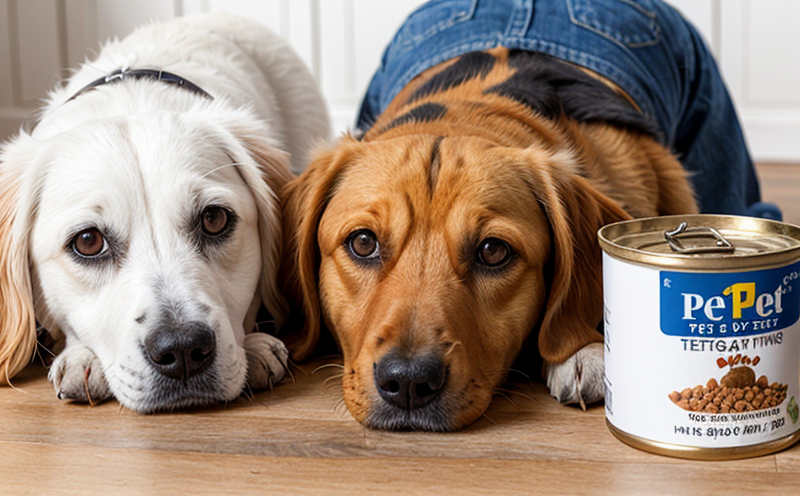ISO 67322 Arsenic Analysis in Pet Supplements
The ISO 67322 standard provides a robust framework for the accurate and reliable determination of arsenic content in pet food supplements. Arsenic is an essential element that plays a critical role in various biological processes, but its presence at elevated levels can lead to toxicological concerns.
In the context of pet nutrition, arsenic analysis is crucial due to its dual nature: it is both a necessary trace element and a potential toxin when present above safe limits. This service ensures that pet food manufacturers comply with international standards and regulations, thereby safeguarding the health and well-being of pets consuming these products.
The ISO 67322 method uses inductively coupled plasma optical emission spectrometry (ICPOES) for precise measurement of arsenic content. This technique is renowned for its high sensitivity and specificity, making it ideal for detecting trace amounts of arsenic in pet food supplements. The standard specifies the use of this analytical approach to ensure consistent and accurate results.
Compliance with ISO 67322 not only ensures product safety but also enhances brand reputation by demonstrating a commitment to quality and regulatory adherence. This service supports pet food companies in meeting global market demands, particularly in regions like Europe, where strict regulations are enforced.
The analytical process involves several key steps: sample preparation, digestion, dilution if necessary, and subsequent analysis using the specified method. Sample preparation is critical as it directly impacts the accuracy of the final results. Properly prepared samples ensure that all components are uniformly distributed, allowing for consistent measurement across multiple batches.
Once the sample has been prepared, the next step is digestion, which typically involves the use of strong acids to break down complex organic structures into simpler forms that can be analyzed. Dilution may be necessary if the concentration exceeds the detection limit of the instrument used. After these preparatory steps, the sample is ready for analysis via ICPOES.
The analytical technique employed in this service provides precise and accurate results within a specified range of concentrations. The standard outlines specific limits of detection (LOD) and quantification (LOQ), which are essential for understanding the reliability of the test results. LOD refers to the lowest concentration of arsenic that can be reliably detected, while LOQ indicates the minimum concentration at which the method can provide accurate quantitative measurements.
Accurate reporting is another critical aspect of this service. The report generated from ISO 67322 analysis includes detailed information about the sample, including the type of pet food supplement tested, the batch number, and the date of testing. It also provides a comprehensive breakdown of the results, highlighting any exceedances of safe arsenic levels.
The importance of this service cannot be overstated in today's competitive market where consumer trust is paramount. By adhering to international standards like ISO 67322, pet food manufacturers can ensure that their products meet or exceed regulatory requirements, fostering confidence among consumers and distributors alike.
International Acceptance and Recognition
The ISO 67322 standard is widely accepted across the globe due to its stringent quality control measures and consistent results. Many countries, including those in Europe and North America, have adopted this standard as a benchmark for arsenic analysis in pet food supplements.
European Union regulations mandate compliance with ISO standards for product safety assessments, which include accurate arsenic testing. In the U.S., while there isn't an equivalent federal regulation specific to ISO 67322, many states and industry associations encourage or require adherence to these international standards.
The recognition of this service extends beyond regulatory compliance into the realm of brand reputation. Companies that demonstrate their commitment to quality through adherence to such rigorous standards are often viewed more favorably by consumers who prioritize health and safety in pet care products.
Additionally, ISO 67322 is recognized for its role in facilitating international trade. By ensuring consistent testing protocols across borders, it helps eliminate barriers that could arise from differing national standards. This uniformity promotes easier exportation of pet food products without the need for retesting or additional documentation.
Competitive Advantage and Market Impact
The implementation of ISO 67322 in pet food manufacturing offers significant competitive advantages. Firstly, it enhances product safety, which is a key concern for consumers today. By ensuring that arsenic levels are within safe limits, companies can build trust and loyalty with their customer base.
Secondly, compliance with this standard sets a benchmark for quality that differentiates products in the market. Pet owners are increasingly seeking out brands that prioritize health and safety, making adherence to ISO standards an attractive selling point.
From a business perspective, meeting such rigorous standards can open up new markets and opportunities. It allows companies to enter regions where strict regulations are enforced without having to adapt their testing methodologies. This consistency also simplifies compliance for multinational corporations operating in multiple countries.
The impact on the market is substantial. Consumers are more likely to purchase products that they perceive as safe, leading to increased sales for compliant manufacturers. Furthermore, this service supports the broader trend towards transparency and accountability in pet care products, which resonates well with modern consumer values.
Use Cases and Application Examples
| Use Case | Description |
|---|---|
| Daily Quality Control Checks | Regular testing of raw materials to ensure that arsenic levels do not exceed safe limits. |
| Batch Verification | Verification of the final product batch before distribution to ensure compliance with regulatory standards. |
| Supplier Audits | Testing of raw ingredients from suppliers to verify their adherence to quality and safety protocols. |
| New Product Development | Development of new pet food products that meet or exceed current and future regulatory requirements. |
Educational Seminars for Staff: Conducting regular seminars to educate employees about the importance of ISO 67322 compliance and best practices in sample preparation and analysis.
Internal Audits: Regular internal audits to ensure that all aspects of the testing process, from sampling to reporting, are conducted according to ISO standards.





